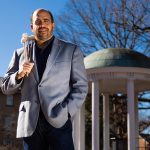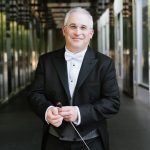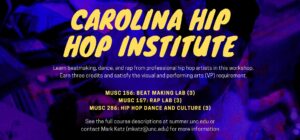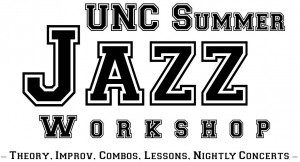As the semester comes to a close, it’s time to solidify your summer plans! Still not sure what summer school courses to take? Check out the complete list of music department offerings below!
Maymester, May 11 – May 27, 2022

MUSC 239: Introduction to Music Technology
Professor Lee Weisert
Monday – Friday, 9:00 AM – 12:15 PM
MUSC 286: Music & Incarceration in the United States CANCELED
Professor Mark Katz
Monday – Friday, 1:15 – 4:30 PM
This class explores the musical lives of incarcerated people in the United States, particularly since the early 20th century. At heart, the course examines how people claim and reclaim their humanity through music in a system that is fundamentally dehumanizing. Among the questions that will guide discussion include the following: What roles does music play in the lives of incarcerated people? How have incarcerated musicians and their music been represented in scholarship and by the media? What ethical challenges and considerations face scholars and musicians who engage with incarcerated people? The class will examine a variety of musical genres and combine historical and ethnographic approaches. In the latter part of the class, students will engage with incarcerated musicians in North Carolina.

MUSIC 286: Music as Culture: Frank Ocean
Associate Professor Michael Figueroa
Monday – Friday, 11:30 AM – 2:45 PM
This course will focus on the music of Frank Ocean. We will develop critical listening skills through close examination of his artistic output, while exploring a number of cultural issues through a variety of course materials; these will include academic readings drawn from musicology, cultural studies, critical race theory, and queer studies, along with alternative media forms, such as podcasts, zines, radio shows, and interviews. The course has no pre-requisites, and the instructor welcomes students from a diverse array of academic, artistic, and cultural backgrounds.
Summer Session I, May 11 – June 16, 2022

MUSC 112: Richard Luby International Violin Symposium
Associate Professor Nicholas DiEugenio, director
May 9 – 14, 2022
The Luby Violin Symposium is a one-week immersion course for advanced violinists within the context of a supportive and nurturing atmosphere. This year’s faculty members include Fabian Lopez (UNCG), Kevin Lawrence (UNCSA), Shannon Thomas (Florida State), Aaron Berofsky (UMICH), and Nicholas DiEugenio (UNC-CH). This year’s guest artist is violinist Tom Chiu, composer and founder of the Flux Quartet and a former collaborator with free jazz legend Ornette Coleman. If you are interested in taking the course, please contact Dr. DiEugenio at nwd@unc.edu or fill out this info form.

MUSC 145: Introduction to Jazz
Associate Professor Juan Álamo
Monday – Thursday, 3:00 – 5:00 PM
Despite of its relatively short history, Jazz is arguably one of the most innovative, creative, influential, diverse and important musical style of the 20th century. However, what exactly is Jazz? Is it folk music, is it popular music or is it an art form? Where, how and by who was jazz developed? What are the musical characteristics that define jazz and difference it from other musical styles? How much has jazz changed over the past 100 years? What is the role, importance and relevance of jazz in our current society? What is the future of Jazz? These as well as many other questions will guide our discussion about the origins, developments and contribution of jazz music and its artists to the humankind in the past 100 years. Thus, the main goal of this course is to study this music through the context of the great jazz artists and the various/different jazz styles of the past 100 years. We will learn about jazz’s historical, social and cultural significance by listening to, reading about and researching the artists, instruments and various jazz styles such as Dixieland, Swing, Bebop, Cool Jazz, Hard Bop, Avant-Garde, Latin Jazz and the Jazz fusion of the 1970s among others.
No prior knowledge of music theory or music history is expected or needed, as the classroom subject and text book will help students to learn and understand the essential musical and historical concepts that will facilitate a greater understanding and appreciation of jazz.
Having participated in this course you will be able to do the following:
- Identify salient musical features that define and distinguish the leading artists and styles of Jazz.
- Explain how culture, society, politics, and history inform the meaning and sound of this music.
- Synthesize the materials learned in this class into coherent and factually accurate discussions of Jazz history.
Required Text: Scott Deveaux and Gary Giddins. Jazz: Essential Listening. New York. W. W. Norton & Company, 2011.
This course fulfills the VP, US, and NA general education requirements.

MUSC 146: Introduction to World Musics (Latin American Music)
Drew Borecky, Second-Year Graduate Student
Monday – Thursday, 4:15 – 6:15 PM
The study of music in and as culture, for this iteration, focusing specifically on Latin American Music.
This course fulfills the VP and BN general educations requirements.
MUSC 148: Introduction to Black Music CANCELED
Aldwynn Hogg, Jr., Ph.D. Candidate
Monday – Friday, 9:15 – 11:45 AM
This course surveys the history of black music in America from the time of slavery to the present moment. We will also focus on the various historical intersections between black music and other domains of human thought and activity such as: politics, aesthetics, commercialism, and spirituality. No prior music experience is required!
This course fulfills the VP and US general education requirements.

MUSC 281: Popular Song in American Culture: The History of the Music Video
Sarah Lindmark, Third-Year Graduate Student
Monday – Friday, 1:15 – 2:45 PM (REMOTE)
Learn about music videos, from the early 20th century (musical short films) all the way up through the present, with TikTok! We’ll be critiquing music videos in discussion, and everyone will be able to bring in their favorite videos to class.
This course fulfills VP and NA general education requirements.
Summer Session II, June 20 – July 26, 2022

MUSC 121: Fundamentals of Music
Professor Evan Feldman
Monday – Friday, 9:45 – 11:15 AM,
This course covers the musical building blocks of pitch, melody, rhythm, meter, harmony, and form, along with the notation system used in Western art music. The course will be helpful for students who wish to read and write conventional musical notation; to understand the concepts and systems behind music they play, sing, and hear; and to prepare for further academic studies in music theory, composition, or performance.
We will be exploring connections between sounds, written notation, and very abstract concepts. In a typical classroom, there is constant aural reinforcement of these ideas, and there is group participation in the acquisition of these skills. Students clap together as they learn rhythms, sing together as they study melodies, and gain the tactile experience of playing intervals or chords on a piano. In an online course format, you will still have all of the same resources. The aural reinforcement will be provided through interactive videos and sound files; the discussion forums allow you to interact with your classmates; the assignments and exercises will encourage you to physically engage with the music as you learn new skills; and web-based drills will let you practice your new skills with instant feedback.
Each week there will be a required recitation (to be scheduled based on student schedules) plus asynchronous on-your-own work with interactive video lectures (interactive in the sense that you will be encouraged to sing and tap along).
This course fulfills VP general education requirement.

MUSC 145: Introduction to Jazz
Professor Donald Oehler
Monday – Friday, 9:45 – 11:15 AM
Curious to know how we got from point A to point C (Via point B)? Join me this summer in late June and let’s find out. Check out the links.
1931 Point A: https://www.youtube.com/watch?v=1bKstQNsQKc
1952 Point B: https://www.youtube.com/watch?v=r-6Pb8W_Qes
2010 Point C: https://www.youtube.com/watch?v=agyor0ksmqw
A survey of jazz music: An introduction to critical listening in jazz. A blend of listening to jazz, discussion of music materials with historical and cultural contexts. No musical background necessary, just open ears.
Three credit hours. Satisfies the following General Education requirements: Visual and Performing Arts (VP), U.S. diversity (US), North Atlantic World (NA).
Course goals:
- Develop a basic understanding of the elements of jazz music.
- Develop a basic understanding of the time line (history) of jazz music.
- Develop an understanding of the significance of jazz music in the greater twentieth and twenty first century musical scene.
- Develop a fundamental ability to discuss and critique jazz music performances using appropriate vocabulary and jazz terminology.
- Develop aa daily personal listening log.

MUSC 147: Introduction to Music of the Américas
Justin Frankeny, Fourth-Year Graduate Student
Monday – Friday, 1:15 – 2:45 PM
An introduction to Latin American music within broad cultural, political, and historical perspectives. We will discuss the large diversity of musical practices from North America, South America, and the Caribbean in relation to the sociopolitical conditions that allowed different communities to express themselves through sounds and music. In our discussions of genres such as samba, tango, salsa and reggaeton, we will discuss the relationship of these genres to concepts such as colonialism, diaspora, migration, and globalization. Students can expect to become familiar with basic listening skills, although no prior musical training is necessary. There are no prerequisites. For more information, please feel free to email Justin Frankeny at frankeny@live.unc.edu.
This course fulfills the VP and GL general education requirements.

MUSC 240/ASIA 240: Performance in Southeast Asia: Gongs, Punks, and Shadow Plays
Lecturer John Caldwell
Mondays, 6:00 – 8:35 PM (REMOTE ONLY, MOSTLY ASYNCHRONOUS)
The study and comparison of contemporary Southeast Asian performance genres (music, theatre, dance, ritual) in historical and cultural contexts.
This course fulfills these General Educations requirements:
- Beyond the North Atlantic World (BN)
- Global Issues (GL)
MUSC 286: Jazz in the Era of #BlackLivesMatter CANCELED
Ken Ge, Second-Year Graduate Student
Monday – Friday, 1:15 – 2:45 PM
An exploration of postwar jazz history and criticism, focusing especially on jazz’s contested meanings as a genre, its ascendancy into an institutionalized, globalized music, and the key question of how to study jazz and/as Black music history amidst white heteropatriarchal capitalist supremacy. Returning continually to the sounds and struggles of jazz since World War II, students will develop 1) rhetorical fluency in both spoken and written modes, 2) a capacity for deeply attentive listening to music, 3) a basic historical scaffolding for postwar American music history, 4) academic comprehension, research, and retention skills, and 4) a sociopolitically-informed sense of musical self.
 The Carolina Hip Hop Institute
The Carolina Hip Hop Institute
Professor Mark Katz, director
June 20 – July 1
The Carolina Hip Hop Institute is an 11-day program that immerses students into the art and culture of hip hop. Students choose from one of three courses: MUSC 156 (Beat Making Lab), MUSC 157 (Rap Lab) and MUSC 286 (Hip Hop Dance) and earn three hours of college credit to satisfy VP (visual and performing arts) requirements. Instructors are experienced, professional artist-educators who will work with students to develop their artistry as well as foster skills in entrepreneurship and conflict transformation through hip hop. Each class day has two parts: a focused session with individual teachers and, following a dinner break, jam sessions and discussions among the three classes. No audition is required, but students should be committed to learning or developing skills in rap, beatmaking, or dance; some experience is helpful but not required. The program will take place June 20 to July 1, 2021, meeting from 3:00 to 7:30 p.m. The program draws its instructors, structure, and philosophy from the Next Level (https://www.nextlevel-usa.org/) international hip-hop exchange program, which was developed at UNC and has conducted workshops in 30 countries since 2014. Please contact Prof. Mark Katz (mkatz@unc.edu) for more information.
MUSC 156 Beat Making Lab
An introductory hands-on study of the composition of electronic instrumental tracks for hip-hop and dance music. Students make beats, learn about the history and culture of the art form, and examine beat making as a case study in entrepreneurship. MUSC 156 is offered as part of The Carolina Hip Hop Institute.
MUSC 157 Rap Lab
An introductory hands-on study of the art of emceeing. Students engage in a rigorous lyricism curriculum, developing the skills to write, recite, and improvise lyrics in live and recorded settings. Students also explore the history of hip-hop culture and analyze the aesthetics of emcees from around the world. MUSC 157 is offered as part of The Carolina Hip Hop Institute.
MUSC 286 Music as Culture: Topic: Hip Hop Dance and Culture
An introductory hands-on study of the art of hip hop dance and its culture. Students will learn a variety of urban dance styles and well as study their history and culture. MUSC 286 is offered as part of The Carolina Hip Hop Institute.
 MUSC 364 The UNC Summer Jazz Workshop
MUSC 364 The UNC Summer Jazz Workshop
Professor Stephen Anderson, director
June 20 – 24
Satisfy the Experiential Education requirement by attending the UNC Summer Jazz Workshop. This five-day course runs Monday through Friday, June 20-24, 2021, from 9:30 a.m. to 9 p.m. daily (with breaks) and applies to Summer Session II (though the course dates and daily schedule are different than other courses offered during Summer Session II).
Students have their choice to attend the workshop in one of two ways:
- (Non-performance) – Students may opt to enroll in the Jazz History/Music Journalism through social media class at the workshop where they study jazz history and learn basic music skills. They will watch videos of jazz concerts and learn how to write reviews using blogs and other forms of social media. These students are not required to perform during the workshop or to have any prior musical training.
- (Performance) – Students may opt to enroll to perform on their instrument while studying jazz theory, jazz improvisation, participating in jazz combos, masterclasses with guest artists, and while taking group lessons on their instruments. At the close of the week, student performers will participate in the Final Friday Student Concert for the family members of the participants.
APPLICATIONS FOR THE WORKSHOP MAY BE SUBMITTED HERE.
LEARN MORE ABOUT MUSC 364 UNC SUMMER JAZZ WORKSHOP AT https://music.unc.edu/summerjazzworkshop.
For more information contact, Dr. Stephen Anderson at anderssr@email.unc.edu.
